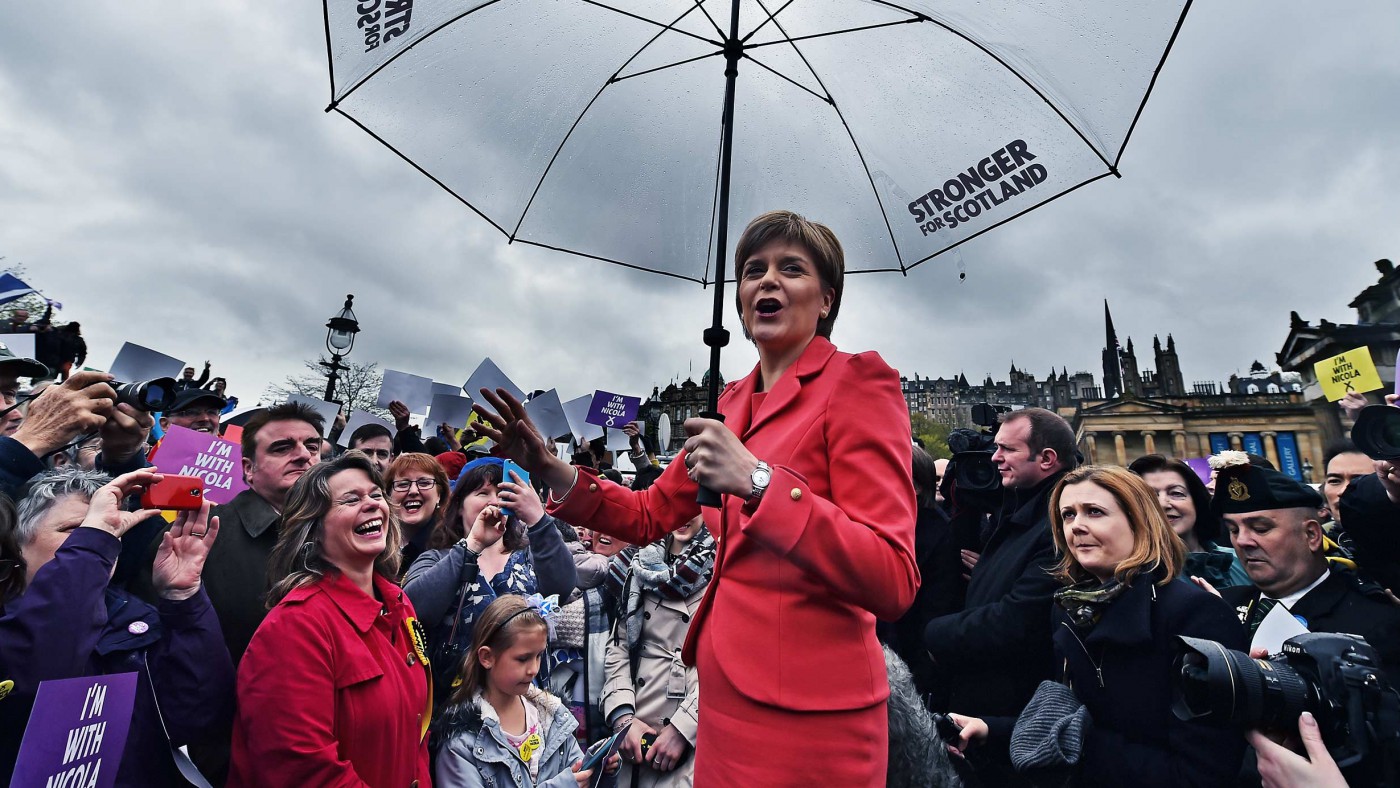The small things are telling. Earlier this month, on the day the Queen became Britain’s longest serving monarch, Scotland’s First Minister, Nicola Sturgeon, was asked if an independent Scotland would retain the monarchy. She could have simply said “yes”. Instead, she said “my view and this was a view expressed during the referendum campaign last year is that, yes, the Queen, who is Queen of Scots, would remain head of state in an independent Scotland.” In other words, Nicola Sturgeon, having so far avoided bending a knee to the Queen, has bent a knee, just a little, to the SNP’s more radical arm. What was once SNP policy is now simply her view. It’s a view for which she was roundly castigated by a number of her supporters. She is not quite unchallenged any more.
We should, of course, not read too much into this, any more than we should read too much into tealeaves. Both can mean something or nothing. But I think we can be sure that though little dissenting noise may be heard publicly, the run-up to the Scottish elections on 5th May 2016 will not be perfectly smooth for the SNP hierarchy. There would have to be an earthquake for the SNP to lose, and earthquakes do happen. Barring an earthquake, however, and even though the Nat record in government at Holyrood is, in crucial aspects, lamentable – for example, according to the Scottish Survey of Literacy and Numeracy 2014, Scottish children’s literacy is in decline – Nicola Sturgeon will be more worried about dissent among the swelled SNP rank and file than about her political opponents.
Scotland is currently a one-party state. This isn’t only because the SNP currently has 64 seats at Holyrood to Labour’s 38, meaning they need to gain only one more for an overall majority whilst Scottish Labour needs 27, the Tories 50, the LibDems 60 and the Greens 63. Those are numbers fit for China. But numbers are not even half the story. Scotland appears paralysed. Most days, there’s probably more vigorous disagreement amongst the SNP rank and file than amongst the wider Scottish electorate.
The lack of dissent in the public domain doesn’t indicate active support for the SNP. Nothing so positive. Non-SNP supporters are mired in a kind of gloomy astonishment. How is it that a year after losing the referendum, the SNP have snatched victory from the jaws of defeat? And this turn of events is so unScottish! By tradition, don’t Scots snatch defeat from the jaws of victory?
Unionists, who have done just this, should make more of this jokey proof of their patriotism but nobody’s even smiling. Living in a one-party state is demoralising; listening to political discussions in a one-party state more demoralising still. Ministers can spout guff without repercussion and it’s hard to blame them for being complacent. If there’s no political danger, there’s little political energy. Scottish Labour leader Kezia Dugdale, and Scottish Tory leader Ruth Davidson, both struggling for votes, can flag up the SNP government’s manifold failings and we all know it’s just so much shouting. This is the SNP’s moment.
Nor, when the Nats do begin to fade, as they will, will other political parties be able to claim credit. Nat-rot will be generated internally: a scandal here, a scandal there, a revolt over the monarchy, over fracking, or perhaps over the madder Nats’ dreams of catapulting anybody who dares disagree with them over the border even if this reduces the Scottish tax-take to 18th century levels. Whatever, the Nats will eventually lose their touch and the internal discipline which, since the Scottish parliament was restored in 1999, has been a key factor in their success, can’t be maintained forever. Knowing this, many Scots feel the best policy is simply to wait, and if you want to wait without a good bashing from the cyber-Nats, you need to wait in silence.
Silent waiting is democratically unhealthy. Luckily, the silence isn’t absolute. For example, apart from the unionist parties at Holyrood, the not-for-profit organisation Scotland in Union, a ‘non-party movement which unites people around a positive view of Scotland in the UK’ and whose banner pictures would warm the heart of Walter Scott, offers not just ‘why I voted no’ articles, but also a critique of the SNP government’s policies. It has links to dissenters: Alan Cochrane, Scottish Editor of the Daily Telegraph, on “Sturgeon could be the Thatcher of the Nats” is a lively voice. In private, too, conversations are taking place, though many are less about fighting back and more about tired resignation. I’ve lost count of the number of times I’ve been asked if we’ll move south when, not if, Scotland decides to go it alone.
I’ve written elsewhere that I’d remain in Scotland and I think this still holds true. I don’t want to see the end of the UK, but one benefit of Scottish independence might be that the SNP would be forced to confront the electorate stripped of the childish, dog-whistle anti-Westminster rhetoric it currently uses both as battering-ram and shield. The results could be interesting. I’d like to be around to see the look on our current First Minister’s face if independence opened the way to a Scottish Tory revival. Couldn’t happen? That’s what was said about nationalism as late as 1995.
Scotland may seem completely in the SNP’s grip at the moment, but even as the Nats belt out ‘Scots Wha Hae’ at the end of their conferences, Justin Timberlake’s “What goes around, comes around” hums gently in the background. It ain’t over till it’s over, and though it’s sometimes hard for Scots to remember, it ain’t over yet.


